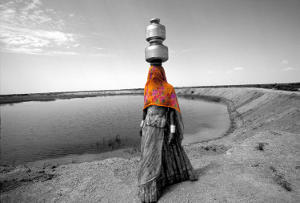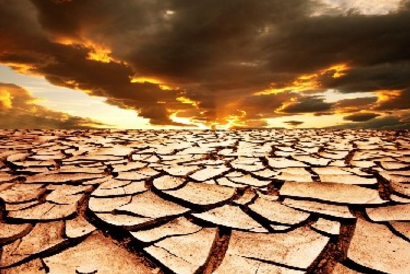She is ignorant of the fact that presence of El Nino, the climate cycle can change the weather patterns drastically, influencing the ocean conditions for a prolonged period of time. What she knows is- It’s is very hot and God is not showing any mercy on his disciples.
Chamki, a 24 year old woman and mother of two has to walk almost 14kms everyday to quench the thirst of her family. She lives in a small village of Madhya Pradesh near the highway. Recently, every morning she used to carry her two urns, one placed suitably over her head and the other kept on another side of her waist. While covering the long distance, she used to flit her urn from one side of her swinging waist to the other. Even though she felt the warmth of the scorching heat on her tanned body with her lips and heels cracked, she managed to get the vitality. Apart from her two kids, Gangu, the cow is the one whom she adores the most. Because of Gangu, the kids could fill their stomach with a glass of milk per day. Life gave her a tough blow when her husband passed away two years ago.

Chamki had a small farmland where she used to grow various seasonal crops. Her farmland bestowed by both Rabi and water guzzling, Kharif crops. She used to get her rice, wheat and pulses directly from the farm and fed herself and her children. Her kids used to attend Anganwadi School where they gorged their stomach with the free mid-day meal. The village had natural water reservoirs, few rivers and ponds.
The year 2016 is giving Chamki and her family almost a glimpse of death. This year-they are crying for a single drop of water. They console themselves by praying Lord Indra, the God of rain and thunderstorms. Days and nights pass praying however there are no signals of aggressive clouds till now. The denial of rain coming to earth converts the fertile land into a barren field. The crops in her farm have lost their lives and the saddened surrounding is crying in despair.
![]()
The drought has fallen upon the village, taken its toll on the villagers and now leading towards the dangers of famine. There is hardly any water in the nearest water bodies. They have dried up. Hence, she is covering long distances to get at least drinking water. Because her farm remains lifeless, she is unable to feed her child and they are becoming victims of malnutrition.
Chamki never applied for ration cards. In fact, she was not aware of it fully as she used to enjoy food directly from her farm. The government officials issued red (below poverty line) and white (above poverty line) ration cards which helps in getting 35kg and 20kg food grains per month. However, the people who enjoy the service are asked to share with the rest which shows that no one can have their food satisfactorily. It seems the government couldn’t cover majority of the drought areas. It is only the 40% of the drought affected region which can enjoy the ration benefits. Chamki breaks into tears when her children are chased by the Anganwadi School mentioning that they come from a poor tribal family.
Gangu is passing her days with great difficulty. There is a practice over centuries known as
Anna Pratha where the fodders are untied and left to fend themselves in the monsoons during the drought season. The livestock return to the villages once the climate turns favorable. Chamki follows the ritual and does the same. She unties Gangu and hopes that Gangu survives by foraging however Gangu never come back.

Days pass by, Chamki and her family loses hope. She finally decides to move towards the nearest city where she can work and buy the basic amenities of life. She takes her baggage along with her two kids and steps forward towards a much harder life.
In those millions, Chamki is just another example of a drought victim. There are innumerable cases if we turn to these drought hit areas. Are we still waiting for government’s action? For which special dictum our hope filled eyes are anticipating? Are we still waiting for the declaration of absence of no mitigation fund under the Disaster Management Act? Can’t we voluntarily help our neighbors, any nearby village with funds or with appropriate water supply? Let’s reach out to them- it is not so difficult now a days. If one can’t go personally make sure you contribute some or the other way or you can join hands with any NGO’S to provide relief to the drought victims. Remember, drought can beat them up all. Don’t let our future dry up.






